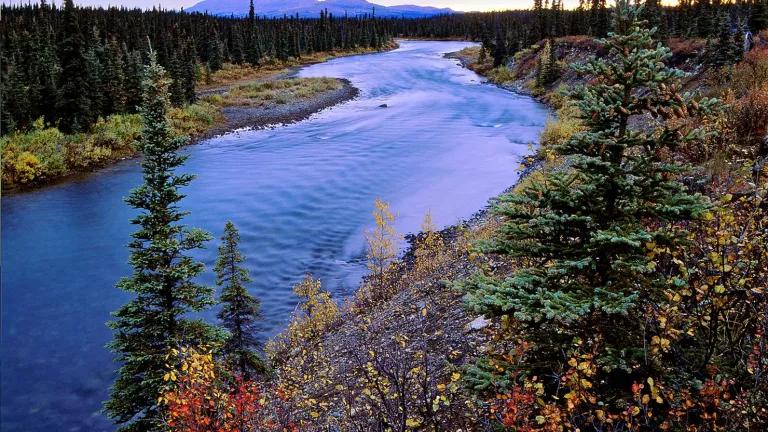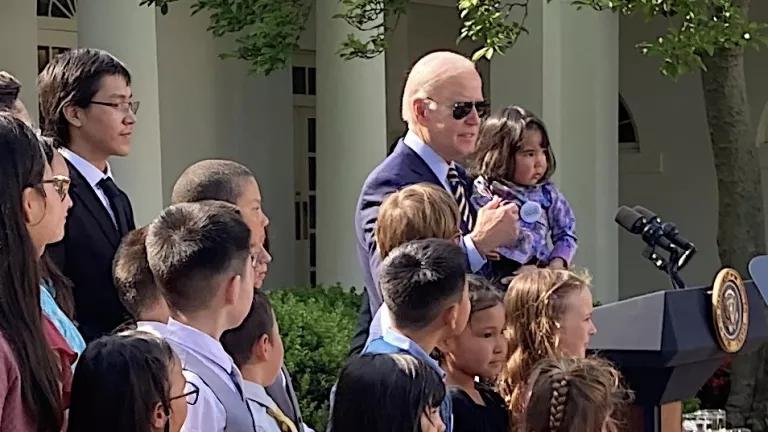Pebble Mine 2022 Year in Review: “Goodnight Soon!”
The end of embattled Bristol Bay mining scheme is in sight, as EPA recommends veto long sought by Bristol Bay Native Tribes—and funding is secured for land conservation agreement that blocks proposed access to mine site.

Bristol Bay Watershed
If there’s ever been a more widely condemned mining project than the Pebble Mine proposed for Alaska’s Bristol Bay headwaters, we haven’t seen it:
- Over the past decade, millions of public comments have been submitted to the U.S. Environmental Protection Agency (“EPA”) or the Army Corps of Engineers urging the agencies to veto or block the project—actions overwhelmingly supported in the region, in Alaska, across the nation, and internationally.
- By 2014, the project’s three major mining company partners—Mitsubishi Corporation in 2011, Anglo American in 2013, and Rio Tinto in 2014—had abandoned the project.
- In the Fall of 2020, both Alaskan Senators announced their strong opposition to the mine, as did candidate, now President, Joe Biden. The Trump Administration’s Army Corps of Engineers denied a permit for the project in November 2020.
- In June 2021, the Pedro Bay Corporation, an Alaska Native corporation and the owner of land sought by Pebble to develop for access to the proposed mine site, signed a conservation agreement to protect that land from development, with a $20 million funding deadline of December 31, 2022.
Yet, after a decade and a half of unrelenting opposition, the project’s financially challenged Canadian owner Northern Dynasty Minerals and its wholly-owned subsidiary the Pebble Partnership (“Pebble”) have continued to fight, refusing to walk away, in denial of the will of the people. In 2022, as discussed in detail on this blog in February, the battle for Bristol Bay—its tribes, their communities, their wildlife, and the world class salmon fishery that sustains them—has become a test of our democracy.
As 2022 moves to the rear-view mirror, there is no good news on the horizon for the Pebble Mine or its Canadian owner. Over the past year the opposition has remained focused and united, with a consistently unequivocal message both to the project’s owner and its shareholders (“No Means No”) and, more importantly, to EPA (“Finish the Job,” “Be a Hero for Bristol Bay,” “Back Bristol Bay,” and “End the Threat”). The agency continues to consider petitions from Bristol Bay Tribes, supported by a broadly diverse coalition of stakeholders, for a science-driven agency veto of the project under Clean Water Act section 404(c).
Messages of urgency and support have been communicated to EPA throughout the past year in a number of ways. Half a million public comments were submitted in support of a veto during the agency’s formal 404(c) comment process, concluded on September 6th. Repeated waves of paid media appeared in February, March, April, May, June, September, and October (full page ads in major newspapers including the New York Times, Washington Post, Politico, and The Hill; on-line ads on high volume internet platforms; and videos featuring Bristol Bay leaders) urging EPA to complete its process and issue the requested veto by the end of 2022. Bristol Bay leaders held press events and travelled to Washington, D.C. to meet with legislators in May and September, and Tribal representatives met periodically with EPA officials in formal consultation meetings required by federal law.
The good news is that EPA appears to have gotten the message. The agency issued a Proposed Determination in late May, completed its public comment process by early September, and released a Recommended Determination on December 1st. Under its regulations, a Final Determination is now required within 60 days of that date. Although Pebble and the State of Alaska have consistently opposed issuance of a 404(c) veto, neither has requested a delay, and EPA is expected to act by the end of January.
If its Recommended Determination is any indication, a veto is certain. As described by Regional Administrator Casey Sixkiller, “[t]his action would help protect salmon fishery areas that support world-class commercial and recreational fisheries and that have sustained Alaska Native communities for thousands of years.”
With no other assets than the Pebble Mine—and with its share price down over 37 percent in the last year as this blog is posted—Northern Dynasty has vowed to challenge EPA’s decision in federal court. If, as expected, its pending appeal of the Army Corps’ November 2020 permit denial is ultimately unsuccessful, it, too, will be challenged. In other words, litigation is a virtual certainty for Pebble in 2023, likely joined by its ally the State of Alaska, led by Governor and loyal Pebble acolyte Mike Dunleavy.
In late October, the House Committee on Transportation and Infrastructure issued an extensive report detailing how “Pebble Mine’s backers tried to trick regulators by pretending to pursue a smaller project with the intention of expanding the scope and environmental effects after the project was approved.” Because, according to a statement by Chair Peter DeFazio, Pebble’s former CEO Tom Collier misled the Committee in his October 2019 testimony to Congress, “[w]e are forwarding the evidence of Tom Collier’s false statements to Congress to the Attorney General’s office for further review.”
On December 22nd, Pebble’s prospects grew still darker. The Conservation Fund and Bristol Bay Heritage Land Trust announced their successful completion of a campaign to raise $20 million required to fund the June 2021 land conservation agreement with the landowner Pedro Bay Corporation. Under the agreement, 44,000 acres of pristine salmon habitat in upper Bristol Bay at the eastern end of Iliamna Lake will be permanently protected, including land sought by Pebble for its proposed infrastructure and transportation corridor to the mine site—access essential under the company’s Pebble Mine plan.
This is a significant achievement for Bristol Bay—for its people, their communities and culture, its wildlife, and the world class wild salmon fishery that sustains them all. In the summer of 2022, the Bristol Bay fishery produced more than 78 million fish—the latest record run—and another staggeringly productive run is predicted in 2023. But it would be put at risk by the Pebble Mine, and that has always been the reason, more than any other, why the project must be stopped.
The Pebble Mine is, after all is said and done, the best example of the worst the world has to offer—a reckless scheme to enrich a Canadian mining company by impoverishing everyone else. And while Northern Dynasty, its executives, and their desperate shareholders get the profit, Bristol Bay gets the toxic waste -- forever.
2022 was a year of significant progress in the decades-long battle for lasting protection of the national treasure and economic engine that, with EPA’s help, the Bristol Bay wild salmon fishery will remain. In 2023 the end is now in sight. It’s time to put this senseless scheme to bed.
Goodnight Pebble. Goodnight greed.
Goodnight destruction we don’t need.
Goodnight investors who fail to care.
Goodnight ruin everywhere.




